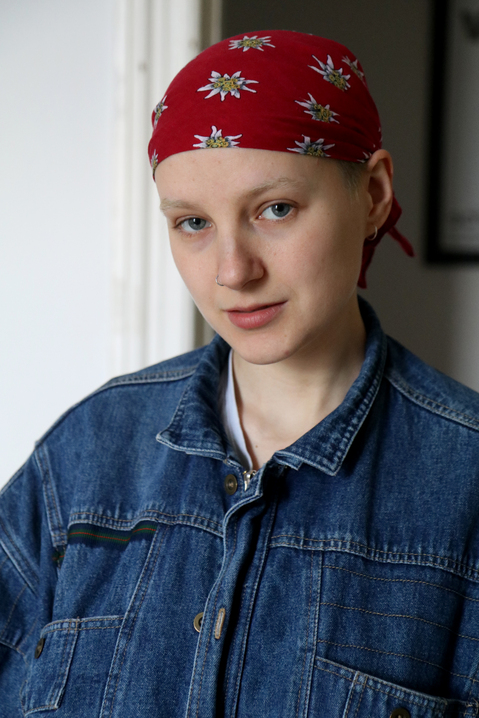Angelique / Anton Shebetko, Ukraine
“I don’t have a story about self-identification. I just realized at 17 that I like other genders too. At the age of 17, I liked my classmate and it didn’t make me feel wrong or different. No, on the contrary, I felt cool.
In general, I’m a pansexual person and I had an inner biphobia. It’s quite common in the community when other people try to sway you to one side or the other. It affected me a little and slowed down my process of full acceptance.
My coming-out took place on Instagram. I liked this girl, and I interpreted this interest as envy. I remember reading a book about psychoanalysis and it was about suppressing desires. That night I had an erotic dream with this girl. I woke up and realized that it was not envy; I just like her. And then I wrote a post on Instagram saying that in case someone didn’t know, I’m a bisexual person.
As for my non-binary nature, I realized it during the lockdown, when I spent a lot of time alone with myself and I didn’t have to play gender roles that were imposed from the outside. It took me longer to realize that I am a non-binary person, because I do not feel any pronounced gender dysphoria and I understand that being born in another body, I would feel just as comfortable. As for societal acceptance , I am very open about my identity and immediately upon acquaintance I say that I am a non-binary person and that my pronouns are “they/them”. For many cishetero people this is something new and incomprehensible, but most do try to respect my pronouns. And if they don’t respect me, then such people have no place in my life.
I didn’t come out in front of my parents, it just wasn’t necessary. My father himself asks me when there was a Pride and if I went to it. I have a very good father, he is not homophobic at all. It seems to me that if a person is good, they do not have any hatred.
In Kyiv, I am involved in activism, mostly aimed at uniting the queer community. I see a lot of positive changes in Ukraine and that is why I live in Kyiv and not in Berlin. In fact, I lived in Berlin for a year and I can compare. In Kyiv, the community is bolder, we have more challenges. In Berlin, people are relaxed, there is no spirit of struggle. When you go to Pride in Kyiv, you immediately feel solidarity, unity, a sense of common cause. And here you go and people are, like, going out for a walk.
Of course, the Ukrainian queer community faces many challenges. First of all, there are homophobic, Nazi things. Before the war, there was evidence, an investigation, that all these actions were sponsored by Russia; most neo-Nazis actually come from Russia and have proven ties to Russian intelligence. Of course, it was very profitable for Russia to paint a picture that there are many Nazis and homophobes in Ukraine.
About war. On February 24, I was in Kyiv, at home. At 6:31 my partner called me and said that they had started bombing Kyiv. It seems to me that this was the worst moment, because at that time a new reality began, with all this horror that is happening now.
On the first day of the war, my partner enrolled in the Territorial Defense. This was his plan in case of a full-scale war. We last saw each other on February 23rd.
At first I went to Western Ukraine, but there are quite big problems with housing and so I decided to go to Berlin, make an exhibition here and raise money for the NGO Insight. We tried to go to volunteer centers or territorial defense, but there were a lot of people everywhere and we were not accepted. I would like to volunteer, but start from what is necessary. However, if the need arises, I will also take part in the war and take up arms.
It seems to me that the war will not strengthen the right-wing sentiments in Ukrainian society. It will be the other way around, because it is a war for freedom, in particular for freedom and liberation of the queer and trans people. We are fighting against the ‘Russian world’ which embodies homophobia. I think that after the war there will be a flourishing of the Ukrainian queer community.”




